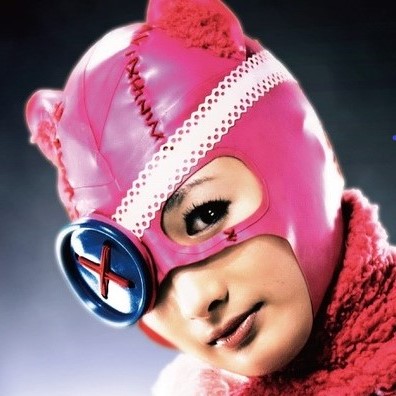I cannot find a single thing about him that’s likable. His ideas are all fucking stupid, and he only got to where he is now through rampant exploitation, disregard for safety in his factories, and stealing the “founder” title from every company he bought. He literally just bought his way to the top, and for some reason people see him as a deity. He isn’t charismatic, like a cult leader, and he gives off the impression that he peaked in middle school. So what about him is so likable to people? I don’t get it, and I probably never will.
You want to live in a better world.
The only place that offers you a vision of a better world is science fiction. The sci fi future is supposed to be better because it has cool things - flying/self-driving/nuclear cars, a colony on mars, that sort of thing - not because of anything relating to living standards or material well being or whatever.
The only methods of enacting change that your society acknowledges are: A - voting, and B - hoping some brilliant billionaire inventor does it for you.
None of the politicians are offering you a science fiction future. Of the billionaires, Elon Musk is the one putting his money into the cool future things. Elon Musk is your hero.
Star Trek Discovery features an Elon Musk reference :agony-immense: :picard-direct-action:
Disco and Picard are revisionist. Lower Decks is the True Star Trek. Prodigy seems like crap based on the one episode I've seen and I have weird optimism about Strange New Worlds cause Anson Mount as Pike is fucking perfect and I want more of it.
Discovery and Picard aren't Star Trek. Lower Decks is Star Trek, but it's bad Star Trek. LD has potential to be good but they need to have Mariner evolve in some way. She reminds me of Rick from Richard and Mortimer and not in a good way.
Mariner already started getting somewhere by the end of the first season and it has continued along with Boimler slowly coming into his own. Season 2 takes a lot of wind out of Mariner's sails, which I just realized was a pun. They've had less episodes than a single season of old Trek and at half the episode length each. I think they've done quite well with character depth considering it is still a more or less episodic comedy.
part of it, i think, is that if you're a true believer in capitalism, you have to believe that the people who rise to the top are the most worthy. another factor is people who are so myopic in their love for electric cars and/or space travel that they are completely uncritical of tesla and spacex. a third one is that he does low-effort pandering to r*ddit types, which does actually work on some people.
I know that all cultures have a lot to owe to legends and stories, but it seems like the entire world has mentally seen itself as part of one of those stories. Porky's the main character, and we're all meaningless background figures that at best, we can exist to do behind the scenes work to make porky feel even more like a hero.
Speaking of which, imagine if one these fuckers just made a fund and donated like 70% of their wealth to solve climate change, and succeeds. They would be hailed as heroes for all eternity, even IF they are the ones responsible for it in the first place, and it would definitely make our job as leftists much harder when people point to them and say "I TOLD YOU we can trust business to do the right thing!"
He's Trump for tech-bros. Projects charisma but in a "nerdy" way, fails upward but spins it into a tale of his own success, and insists that he's hardworking and self made but with eco-tech that'll save the world. His appearance on Rick and Morty is like Trump cameos in Home Alone or something. People want to feel validated that their grind is going to reward them richly, so realtors and business owners like Trump, guys who code and think their tech will end all troubles AND make them rich love Musk, even if they're all making less than 100k and spend so many hours just trying to get by.
they're riding the coattails of the nerdcore aesthetic that started in the late 2000s
he also has acknowledged that anime and bitcoin exists, so he's just like me, zomg
I used to like him about 6-8 years ago.
-
He was bringing back a focus on space where NASA had been anemic for decades, making records with SpaceX engines and rockets and reusability.
-
He was making electric cars a thing again after a century, or at least making hype and market pressure to popularize them.
-
With connections to solar, he was making large-scale rechargeable batteries more of a thing.
-
He was doing all of this with a stated goal of "save the planet, and save humanity from the risk of planetary disaster" which is pretty cool.
-
He was a geek and an immigrant who was bullied in school.
-
As the kicker, he made an announcement saying "All Our Patent Are Belong To You", basically putting all Tesla IP in the public domain in favor of an open-source philosophy. He seemed overall rather left-libertarian, which is what I considered myself at the time.
But then the Hyperloop project was lackluster, the Boring Company was stupid, Neuralink is potentially catastrophic to humanity, his personal life is fucked up, he started to have a bunch of hot takes and petty fights online, and he became really anti-union and it came out how abusive to Tesla and SpaceX workers he was.
-
i think at least in part its born out of some sort of subconscious desperation about the failures of neoliberalism to provide a positive vision for the future as things noticeably get worse, and the inability of western governments to really do anything big and grand any more. im reminded of a graeber passage about how we have abandoned poetic technologies for bureaucratic technologies (technologies to help with filling out the increasing numbers of forms that increasing technology has brought us, rather than big vision technology), and musk does offer a vision of those poetic technologies again - space travel and electric robot cars and hyperloops - jetsons sort of shit. it might not be thought-out or practical, but i think he primarily sells "optimistic vision" which is something i think people miss and long for. especially with regard to the climate, where society seems to have adopted a "surely some super technology will come along in the nick of time to save us" approach, and governments do absolutely fuck all, having a deus ex machina to come along with his big brain genius and high tech solutions and save us from ourselves and lead us into the techno-utopia is a very appealing fantasy. it was a big wow moment in coal-obsessed australia when he built a giant battery in south australia in record time and for supposedly low cost, it was just such a breath of fresh air that anybody was doing fucking anything, it was hard not to hang on to that tiny little bit of hope even if your brain was screaming at you about it being misguided. of course the media never reported when one of these big batteries caught fire and couldnt be put out for four days as it spewed toxic chemicals into the air, but thats the side you only see when you look more closely, and its easy enough to put out of mind once youre in the cult
graeber from the utopia of rules
I would put it this way: in this final, stultifying stage of capitalism, we are moving from poetic technologies to bureaucratic technologies.
By poetic technologies, I refer to the use of rational, technical, bureaucratic means to bring wild, impossible fantasies to life. Poetic technologies in this sense are as old as civilization. They could even be said to predate complex machinery. Lewis Mumford used to argue that the first complex machines were actually made of people. Egyptian pharaohs were only able to build the pyramids because of their mastery of administrative procedures, which then allowed them to develop production line techniques, dividing up complex tasks into dozens of simple operations and assigning each to one team of workmen—even though they lacked mechanical technology more complex than the lever and inclined plane. Bureaucratic oversight turned armies of peasant farmers into the cogs of a vast machine. Even much later, after actual cogs had been invented, the design of complex machinery was always to some degree an elaboration of principles originally developed to organize people.
Yet still, again and again, we see those machines—whether their moving parts are arms and torsos or pistons, wheels, and springs—being put to work to realize otherwise impossible fantasies: cathedrals, moon shots, transcontinental railways, and on and on. Certainly, poetic technologies almost invariably have something terrible about them; the poetry is likely to evoke dark satanic mills as much as it does grace or liberation. But the rational, bureaucratic techniques are always in service to some fantastic end.
From this perspective, all those mad Soviet plans—even if never realized—marked the highwater mark of such poetic technologies. What we have now is the reverse. It’s not that vision, creativity, and mad fantasies are no longer encouraged. It’s that our fantasies remain free-floating; there’s no longer even the pretense that they could ever take form or flesh. Meanwhile, in the few areas in which free, imaginative creativity actually is fostered, such as in open-source Internet software development, it is ultimately marshaled in order to create even more, and even more effective, platforms for the filling out of forms. This is what I mean by “bureaucratic technologies”: administrative imperatives have become not the means, but the end of technological development.
Meanwhile, the greatest and most powerful nation that has ever existed on this earth has spent the last decades telling its citizens that we simply can no longer contemplate grandiose enterprises, even if—as the current environmental crisis suggests—the fate of the earth depends on it.
When I was a kid, the flashy guy with the electric cars who promised to actual do something about the problems sounded cool. The oil companies and other car manufacturers didn't like him, and I hated them, so he had to be for real. He said and did funny stuff sometimes. Eventually I grew up, did my research, and realised I had been tricked. I was an adult, cooking and cleaning for myself, and found iron man was only in comic books.
found iron man was only in comic books.
But the Man Of Steel wasn't :stalin-pipe:
-
Steel > Iron
-
Oh god oh fuck I wonder what hot new takes Musk has on Stalin. "Holodomor? MORE LIKE HOLO-DOME-HER M I RITE?"
-
Pretty similarly, I was kinda excited about Elon Musk in high school. He was, in my eyes, "making environmentalism cool" by selling electric cars. I also remember him saying rainbow, which closeted :gator-bi: me loved.
Eventually, I started to learn that cars themselves were the problem, Elon Musk started to pander more and more to chanbrians and other hogs, and this "just trust corporashunz" shit was the problem.
Because he posts memes he finds on the front page of reddit
He's sort of a technocrat Jesus to a lot of people, as he offers seemingly effective technical solutions to major problems. Almost all of this is fraudulent, of course, but he's fairly good at cultivating this image.
Tom Nicholas did a very good video that I think gets close to what people respond to - https://youtu.be/5OtKEetGy2Y - basically that millenials are a generation who were sold a miserable future their entire lives so anyone pitching a hopeful futurism gets a positive response. Add to that Abby Thorn's point that he codes himself as counter-culture (while actually being the opposite) and I think you're there.
none of what you've mentioned filters down to most people. They just hear about this business guy making futuristic tech, those weird cars, and robots. We're in a weird moment culturally where I'd say half of Americans have probably never even heard of Elon Musk. A lot of people I know had never heard of him until I brought him up. Everyone used to know who Bill Gates and Steve Jobs were, but either through some concerted effort to keep Musk's weirder traits out of the public eye or some kind of modern dissociated public attention span, I have no idea.
"Normal" people who have heard of Musk and like him will know a limited number of things about him. He wants to get humans into space and he runs that company with the expensive cars that are futuristic. That scans as really impressive to most people. Remember when he was on SNL and Grimes showed up as Princess Peach and the crowd seemed confused about who she was? That's because they had no idea who Grimes was or what she looked like, that's the level of non-Musk permeating public awareness right now.
I had a coworker the other week, a normal type guy who has only heard positive things about Musk ask me, "He must be under a lot of stress, right? The amount of stuff he has to worry about on a daily basis." Coworker was a little shocked when I replied "Elon Musk is probably under no stress whatsoever and probably isn't very involved in the practical side of his businesses." First he had heard anyone say anything negative about the guy and my coworker's not a dummy, he's a smart guy who doesn't follow public figures very closely, so he'll just have a surface level of whatever he might see over Facebook or something half remembered from CNN. I expect that's what it's like for most people.
they think he's iron man and don't know about the bad shit he does/did
In the media he's portrayed as the real life Tony Stark and people think that's cool
:so-true: wow snarky genius billionaire man who shares my exact sense of humour will save the planet WITH THE POWER OF SCIENCE
And then he turns around and doesn't save anyone (unless you count giving them free cremation). And if someone else calls him on that failure, he'll call you a pedophile.
:so-true: Yeah but he'll also make me rich with his epic crypto tips
If you don't really look into his background, then Musk just looks like a "quirky and relatable" billionaire and some of his ideas aren't inherently bad (electric vehicles, reuseable rockets) so people see him as a hope for the future of humanity. It sounds stupid but given how most western governments aren't making any meaningful progress in technology and climate change, Elon starts to look like the better option.














